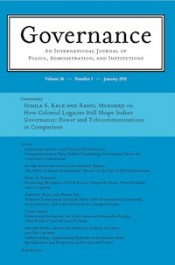Posts Tagged ‘India’
Kerala’s ombudsman: potential limited by an unresponsive state government
In a research note in the current issue of Governance, Joshua Stark reports on the first decade of work by the ombudsman of the Indian state of Kerala. Kerala was one of a host of jurisdictions in the developing world that adopted the ombudsman model to improve accountability within government. Kerala’s ombudsman has had notable successes but its potential is “constrained by an unresponsive state government,” Stark says. The note is based on a longer study supported by Centre for Policy Research and the Research Foundation for Governance for India. Read the research note.
Free download: Mehta on state spending and governance in India
The relationship between democracy and good governance is “more tenuous than we like to admit,” says Pratap Bhanu Mehta, President of India’s Centre for Policy Research, in the lead commentary for the new issue of Governance (23.3, July 2010). But Mehta examines one neglected factor that might improve the prospects for good governance: an increase in the scale of government spending.
In India, Mehta argues, increased state expenditure has improved voters’ attention to governmental performance; changed the structure of corruption in beneficial ways; and allowed government to invest in stronger accountability instruments. “A growth in state capacity,” Mehta concludes, “can, to a certain extent, mitigate the ill effects of unaccountable government.” Download Mehta’s commentary for free.
Pratap Bhanu Mehta writes Governance commentary
Pratap Bhanu Mehta, President of the Center for Policy Research in New Delhi, writes the lead commentary for the July issue of Governance (23.3). “Indian politics,” says Mehta in his July commentary, “has been undergoing two subtle but pronounced shifts that may have larger lessons for the politics of democratic accountability.” Mehta is the co-editor of The Oxford Companion to Politics in India (Oxford University Press, 2010); co-author of Public Institutions in India: Performance and Design (Oxford University Press, 2005); and author of The Burden of Democracy (Penguin Books, 2003).

India, one year after elections: An impasse in Parliament
By Krishna K. Tummala. The South West monsoon in India has failed, but the monsoon session of the Indian Parliament which ended on August 13th was a washout. In a Parliamentary democracy the majority party (or a coalition of parties) comes to power, and the Prime Minister controls. Unlike the case in the United States where powers are separated as a check against one another , in India there is a fusion of the legislature and the executive. One cannot be part of the latter without being a member of the former.
Prime Minister Narendra Modi of the Bharatiya Janata Party (BJP) with other coalition partners in his National Democratic Alliance, commands an absolute majority of a total of 339 (out of 541 members). (Read Professor Tummala’s post about the 2014 elections.) Thus, the lower House of Parliament, Lok Sabha, is his. Yet, he could not shepherd important legislation through the Parliament as he found himself in a minority in the upper House, Rajya Sabha with only 61 members (out of 235 total elected). The Congress Party, which often feels entitled to rule, was nursing its drubbing at the elections, and fighting for political space now, leading the Opposition. Thus, they were not going to provide not even the benefit of doubt to Prime Minister Modi. And he unwittingly gave them three reasons.
Read the rest of this entry »
Written by Governance
September 9, 2015 at 5:54 pm
Posted in Blog comments
Tagged with India